- Home
- Allan Topol
The Argentine Triangle: A Craig Page Thriller Page 9
The Argentine Triangle: A Craig Page Thriller Read online
Page 9
“What’s that?”
“Occasionally, but not often, Americans have been robbed or kidnapped for ransom. We’re a peaceful nation, but in these difficult economic times some people do crazy things.”
“I’m well aware of that. But thanks for reminding me.”
“What I wanted to suggest is that you have an armed bodyguard with you at all times. I can arrange that. At the government’s expense, of course. After all, you are a valued visitor. We’d hate to have anything happen to you.”
And lose my ten billion dollars, Craig thought. He smiled to himself. Suarez was smart. Or Estrada. Whoever thought of this. What a great way for them to keep track of him.
“The offer’s appreciated,” Craig replied politely. “I’ve been in some pretty rough places in the world. I find that bodyguards draw attention to a man and increase the risk. I can take care of myself.”
As Craig put down the phone, he was glad Suarez had called. Now he knew that Estrada would find another way to keep tabs on him. He had to watch his six o’clock from the minute he stepped off the plane in Buenos Aires.
Buenos Aires
An hour out of BA, Craig asked the pilot to call Ezeiza Airport and arrange a car and driver to take him to the Alvear Hotel. Waiting for him when he cleared customs was a tall, well-conditioned man, standing erect like a military officer in a civilian suit with a light brown crew cut.
“Mr. Gorman, I’m Peppone, your driver,” the man said.
Craig resisted the urge to salute as Peppone turned and headed toward his Mercedes sedan parked at the curb. Though it was seven in the morning, Craig was rested and energized. The private jet had a bed and he had slept well.
On the way into the city, Peppone asked, “Is this your first visit to Argentina?”
“Sure is, and I’ve been looking forward to it.”
“Perhaps I can remain with you as your driver for your stay. Take you for sightseeing. Deliver you to meetings. Whatever you need.”
Craig had learned long ago that attaching a driver to a foreign visitor was a good way to keep track of the visitor. Suarez had offered Craig an armed bodyguard but he had refused. It was possible that Estrada or one of his people had learned about Craig’s request for a car and driver and inserted their man, Peppone. Craig would have to be careful with the driver, but he might be able to use him as an advantage.
“That’s a nice offer. I like sightseeing alone on foot with a guidebook, but I may need a driver to go to meetings. Give me your cell phone number.”
Peppone passed him a card.
“I’ll give you as much notice as possible. Don’t worry if you’re busy.”
Peppone laughed. “These days, I’m never busy. Until the weather gets warmer, we don’t have many tourists.”
“Do you drive for a company, or is this your own business?”
“The company I worked for went bankrupt last year. I’m on my own now. I have a wife and three kids to feed.”
The driver’s words pleased Craig. At the right point, for enough money, he might be able to turn Peppone.
Determined to play tour guide, Peppone continued, “There are almost forty million people in Argentina, but more than a third live in Buenos Aires, where the residents are called porteños because of the port in this city. We have over three hundred theatres in Buenos Aires, more than a hundred art galleries, at least seventy museums, and hundreds of bookstores. How many other cities in the world can say that?” he added with pride. “And the city never sleeps.” He began discussing all-night movie theaters and restaurants.
Craig tuned him out. He already knew the basic facts about the city from guidebooks. With his photographic memory, he now had a street map in his mind.
The Alvear Palace, the most luxurious hotel in Argentina and all of Latin America, was located in La Recoleta, an elegant residential and shopping district near the center of town. As the Mercedes approached the hotel, Craig looked out of the window at the fashionable boutiques, cafés, and handsome old apartments. They were only a few blocks from Nicole’s shoe boutique.
The Mercedes turned into the circular driveway of the stately eight-story building. An armed guard stood on each side of the driveway. The economic depression had brought with it increased crime, Craig had read. Anyone with enough money to stay at the Alvear could be a target.
The hotel manager, a burly, heavyset man with thick lenses in black frame glasses, was waiting for Craig on the other side of the revolving front door in the marble-floored lobby, ready to pounce. A team of four bellmen rushed out to the car. Craig told them to take his suitcases, but he clutched the duffel and briefcase tightly in his hand.
After greeting Craig, the manager, Mario Fernandez, introduced himself and led Craig to a heavily polished wooden desk where he signed the registration card.
“How long will you be staying, Mr. Gorman?” the manager asked.
“Indefinitely. I’m considering some investments.”
Fernandez nodded. “Very good, sir. The economic ministry has advised me that they will be taking care of all charges. You’ll be staying in the presidential suite. I believe you’ll be quite comfortable.”
That was one of the great understatements of all time, Craig realized, as the manager led him up to a door marked 801 on the top floor of the hotel. Inside, the suite had a reception hall, a spacious living room with a Steinway baby grand piano, a wood-paneled dining room, a private study, and two bedrooms and baths, both with a Jacuzzi and sauna. All were tastefully decorated. Original paintings and objects d’art were scattered throughout. A butler offered to unpack for Craig. He declined, but gave the man his suits to press. This life as a money man with ten billion to invest had lots of perks.
“Anything we can do to make your stay more comfortable,” the manager said, “call me personally. Extension 2500.”
First stop for Craig was the room that held safe deposit boxes off the lobby. He placed into a vault box all of the cash except $100K and one of the two guns. The $100K and the Beretta he stashed in the briefcase he was clutching.
In the lobby the manger was waiting with a piece of paper in his hand. “You received a call from Mr. Miranda,” he said, pronouncing the man’s name with awe. Craig reached for the paper with Miranda’s telephone number. Suarez and Estrada were anxious. He’d play hard to get. Besides, he had other things to do right now.
“Would you like me to get Mr. Miranda on the phone?” the manager said.
“No thank you. Today is for sightseeing.”
“Can I offer you a car and driver along with a guide?”
“I like being on foot.”
Fernandez had a pained expression on his face and in his eyes behind those thick glasses. His assignment must have been to get Craig to Miranda, or at least to keep track of him. The poor man was failing.
The morning sunlight was bright. The day would be unseasonably warm. Craig was dressed in khaki slacks and a light, powder-blue cotton shirt. He wanted to blend in on the street. In one hand he gripped his briefcase tightly. He held his guidebook in the other.
Exiting the hotel, he turned left along Avenue Alvear passing jewelry stores and fashionable boutiques. He was headed for Teatro Colon, the world famous opera house south of the hotel, about a thirty minute walk. It was long enough for Craig to stop from time to time, pretending to window shop, to see whether anyone was following him. After fifteen minutes, he understood the surveillance. He saw two men, not very good at the job. On foot, was a powerfully-built man with black curly hair in a suit and tie. In a gray Ford sedan, trailing behind, was a man wearing sun glasses.
Craig entered the Colon Theater through the door on Tucuman as any tourist might do. Then he headed for the gilt and red velvet auditorium. He raised his eyes skyward to the huge chandelier in the center with a twenty-foot diameter, and the six balconies that went around the perimeter, reminding him of La Scala in Milan. As he expected, the black curly head didn’t enter the hall, but peeked through the main front door, prepared
to run if Craig raced toward a side door, but he had no intention of doing that. It would have been too easy for them to follow him.
Craig lingered in the lobby for a few minutes to look at pictures of famous performers who had appeared in this hall, including Maria Callas, Arturo Toscanini, and Lucinano Pavarotti. Then he walked out of the front door, raised his hand, and signaled for a cab.
“The intersection of Calle Florida and Avenue Corrientes,” he told the driver.
Midmorning traffic on Avenue Corrientes, lined with movie theaters, restaurants, and bookstores, was heavy. Craig exited the cab, turned the corner and began walking down Calle Florida, a pedestrian thoroughfare jammed with shops selling clothes, shoes, leather goods, electronics, toys—every retail item that anyone might want to buy. The street was mobbed with throngs of people.
Craig threw himself into the crowd. Over his shoulder, he glimpsed the man with curly black hair jumping out of the Ford and following. The driver remained in the car. First there were two. Now only one.
Craig walked quickly, making it difficult for his pursuer to keep up in the crowd. Then he went into a men’s shop. The curly head remained on the street. Inside, Craig bought a navy blue shirt, sunglasses, and a dark blue baseball cap, which he shoved into his briefcase. When he was back on the street he was carrying an empty plastic bag from the shop.
Black curly hair picked up Craig again and resumed following on the sidewalk. In the next block Craig saw what he was looking for: a good sized café. He entered, sat down at a table where he could be seen from the outside and ordered a cappuccino and a croissant while black curly head remained on the street. Craig put the guidebook on the table, pretending to read it as he studied the layout of the café through the corner of his eye. The toilets were in the rear. He heard a lot of commotion coming from that direction. A beer truck was being unloaded and cases carried into the café.
As soon as the waiter put down the cappuccino and pastry, Craig handed the man some money and asked, “Where is the bathroom?”
The waiter gestured with his hand. Craig left the guidebook and the empty bag from the men’s shop on the table and slowly walked toward the bathrooms, briefcase in hand. Anyone watching would be certain he was returning. Once he turned the corner and was out of sight of the front door, he broke into a run toward the rear entrance.
He nearly crashed into a man carrying a case of beer. “Hey, you can’t use that door,” the man shouted, but Craig was past him. The shop backed up to an alley running between Calle Florida and Maipu. Craig darted among trucks making deliveries to other shops until he found the rear entrance of a tea room, which fronted on Maipu. It was unlocked. He ducked inside. A quick look told him the back was deserted. In an instant, Craig changed shirts, donned the sunglasses and cap and headed toward the front entrance. A gray-haired woman in a pale green waitress uniform was arranging pastries in a glass enclosed case. Startled by Craig, she jumped from fright. “What are you doing in here?”
“I came in from the back.”
“We’re not open now. I should call the police.”
“I didn’t realize that,” he said politely. “When do you open?”
“Eleven o’clock.”
Craig saw that the front door was locked. He couldn’t risk her calling the police. “If you’ll let me out, I promise to come back at eleven.”
Outside, Craig pressed his back against the door of the shop. No sign of black curly hair or the gray Ford. He saw an endless stream of empty black cabs on the street. Craig raised his hand and one ground to a halt. He raced to the curb and jumped in. “Plaza San Martin,” he told the driver.
As the cab moved, Craig slipped down on the seat, keeping his eyes just above the rear window line, but he didn’t see the gray Ford.
At the Plaza he cut across the grassy park toward the bronze statue in the center. General Jose de San Martin on horseback. Pretending to be a tourist inspecting the statue of the Argentine military leader who commanded the colonial forces in the war against Spain for independence, Craig was in the perfect vantage point to see if he was still being followed. After several minutes he was satisfied that he had gotten rid of his tail.
He left the park and walked around for fifteen minutes, climbing a steep riverbank, up to Avenue Quintana, a distance of eight blocks. Several times he stopped to look into windows and glance over his shoulder. Nobody was following.
From a block away, he saw the sign across the street that read, “Nicole’s Shoe Boutique.” As he crossed, he looked in the window. Judging from the merchandise and the prices, this was a high-end shop for women. Even in the current economy, some people had money.
Without hesitating, he entered the shop.
“Can I help you?” a woman of an indeterminate age with short brown hair, dressed in a short black skirt and a sheer lavender pullover, asked in a throaty voice. Her eyes were locked on the stranger’s face.
He took off the cap and studied her. She was well built with powerful legs that testified to exercise. Her face was good looking, but she had a bit of a tough edge. Her head was cocked as she gave him a wary glance.
“I’m looking for Nicole.”
She studied him with deep brown eyes like lasers. “I’m Nicole. Who are you?”
Craig discerned apprehension in her voice, even fear.
He took a deep breath. Betty’s information had better be right. If not, he would be blowing his cover before he even began. “Barry Gorman,” he said. “And …”
He was wavering.
“Well,” she said, nervously glancing past him at the door.
“I’m a friend of Ted Dunn’s.”
Swiftly, she walked over to a staircase and shouted down. “Vicki, come up and handle the store. I have to go downstairs.”
Waiting for Vicki to appear, Craig took another look outside. He didn’t see the man with black curly hair.
He followed Nicole down a creaky wooden staircase, leading to a storeroom. Rows and rows of wooden shelves were filled with shoeboxes. Two chairs were next to a small table covered with shipping documents and sales slips.
She eyed him nervously. “Who sent you?”
“The same people who sent Dunn. He was supposed to come back and never did. He hasn’t even called in. He was my friend. I want to know what happened to him.”
She sighed deeply and pointed to a chair. When they were seated across from each other, she said, “I never heard from Dunn again after he went to Bariloche. I assumed he obtained the information he wanted and left the country.”
Craig couldn’t decide whether to believe this woman. “Why did he go to Bariloche?”
“He had learned that General Estrada was having an important meeting. Some foreign visitors were flying in. Dunn wanted to know who they were.”
“How do you know so much about it? What did you have to do with it?” he asked in an accusatory tone that made her head snap back.
She picked up a pack of cigarettes from the table and offered him one. When he declined, she lit up and blew smoke into the air. “Your friend, Dunn, needed a contact in Bariloche. Someone who could help him. I gave him a name.”
“Whose?” he pressed.
“You don’t know me,” she said in a feisty tone. “Why do you imply that I had something to do with Dunn’s disappearance?”
“It’s precisely because I don’t know you that I’m not sure what to believe.”
“Then listen. Don’t interrogate and accuse.”
He pulled back. “Fair enough.”
“I gave him the name of Pascual Frigero who lives in Bariloche. He drives for the biggest limo company in the area, but he’s also a poet and a musician. He hangs out with a crowd that’s opposed to Estrada and the military people.”
“Who were the foreign visitors coming to meet Estrada?”
“You’re so busy trying to intimidate me that you’re not listening. I already told you Dunn didn’t know. That was the point of his trip to Bariloche.”
> Craig had to run out the string with Nicole. At this point, it was all he had. “I’ll have to go to Bariloche and find this Pascual. Tell me about him. How old is he?”
Nicole took another puff and inhaled deeply before responding. “Mid-thirties, I think.”
“Married?”
“No. Lives with his sister.”
“I need a name and address.”
Nicole hesitated.
“I’ll pay you for it. How much was Dunn paying you?”
She laughed. “You Americans always think money is the only reason people do things.”
“For something like this, I’ve found it usually is.”
“Well this time it’s not.”
Craig was surprised. “By helping Dunn and me, you’ve put your life on the line. I’ve read enough about Estrada and his henchman, Colonel Schiller, to know that. If not for money, then why?”
Her face was tight and drawn. She paused to light another cigarette. “You’re a smart man, Barry Gorman. My father owns a shoe manufacturing plant, which makes high-end shoes. Even in this economy, a minority live well. We belong to all the best clubs. This shop is a hobby for me.”
“Then why are you putting your life on the line?” Craig repeated.
“Do you have any idea what happened in my country in the late seventies and early eighties? The last time the generals ruled?”
“I’ve read about the Dirty War if that’s what you mean?”
Her eyes were blazing with emotion. “You have no idea. You were a schoolboy then. Safe in your cocoon in the United States where nobody gave a damn. Here, it was state-sponsored terrorism. The generals claimed that they were attacking the country’s economic problems by eradicating leftist guerillas who were instigators. In fact, they arrested, tortured, or killed thousands and thousands.”
She paused and puffed deeply on the cigarette, blowing out the smoke in circles. “Military patrols roamed the country. Day and night they snatched people from their homes and jobs. Not just leftists. Anyone who dared to disagree with them. Union leaders. Women. Especially women. A third of the ones they grabbed were women from all social classes without any link to the guerillas, just so they could get them into prisons and have their way with them.” She was talking fast now, her voice choked with emotion. “They even took teenagers who campaigned for better school facilities.

 Conspiracy
Conspiracy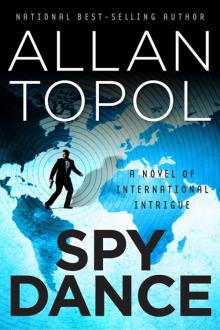 Spy Dance
Spy Dance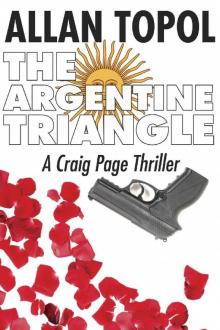 The Argentine Triangle: A Craig Page Thriller
The Argentine Triangle: A Craig Page Thriller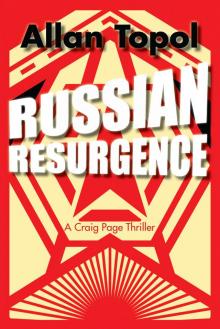 Russian Resurgence
Russian Resurgence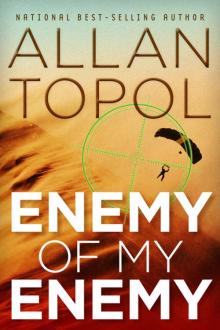 Enemy of My Enemy
Enemy of My Enemy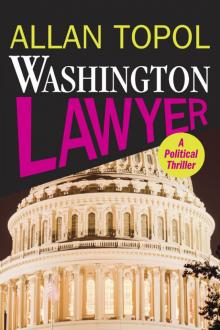 The Washington Lawyer
The Washington Lawyer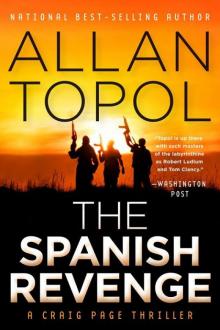 THE SPANISH REVENGE (Craig Page series)
THE SPANISH REVENGE (Craig Page series)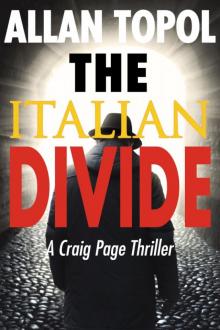 The Italian Divide
The Italian Divide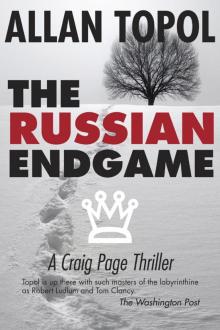 The Russian Endgame
The Russian Endgame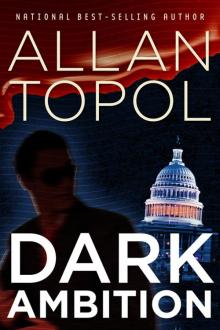 Dark Ambition
Dark Ambition